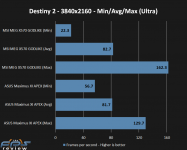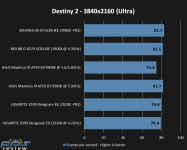Except, this isn't necessarily always going to be the case. I've done extensive testing on this and found that at 4K, CPU's like the 2920X showed the same average FPS as a 9900K lending credence to the whole GPU thing, but playing games on the former wasn't smooth. When I dug into it I found that in a lot of games, the minimum frame rates on certain CPU's were horrendous and thus, not capable of delivering a good gaming experience regardless of the GPU.
Here is an example from my
review of the X570 GODLIKE motherboard. In fact, I wrote about this issue in detail
here.
View attachment 1420
The average frame rates would tell you that these perform the same, but if you look the minimum frame rates are almost half what they were on the Intel system. Now, the Ryzen 5000 series has stronger gaming performance and even the 3000 series issues with Destiny 2 were fixed, but initially the 3000 series required a work around of sorts to even run on those CPU's. This is why it wasn't tested during the initial CPU review.
View attachment 1421
As you can see the averages are all pretty close to each other, but as you can see above, averages don't tell the whole story. What I didn't graph out were the minimums for all of the systems, simply opting to showcase the X570/3900X and the 9900K. However, the 2920X at stock speeds only achieved a frame rate of 26FPS minimum and 36FPS minimum when PBO was enabled. While the averages look good, I can assure you that it was not the best experience as I saw routine drops into the 45FPS range whenever things would happen on screen.
Destiny 2 is admittedly a bit of an outlier, but there are plenty of others too. The moral of the story is that while you are primarily GPU limited at 4K, your CPU does indeed play a role and your minimum FPS and thus, your actual experience can be marred by a sub-par CPU.





